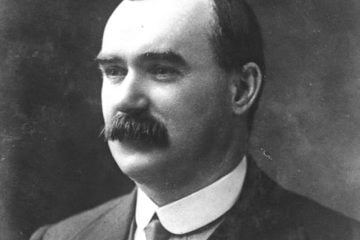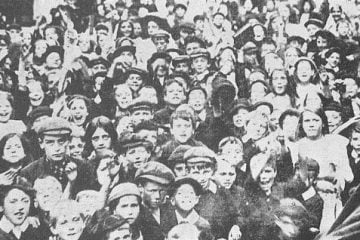It is October 24th: the eve of revolution – though nobody knows it yet. There have been rumours of an imminent uprising against Kerensky and the Provisional Government for days, but (helped in no small part by the efforts of Kamenev, Zinoviev and Stalin to stall events) the Bolshevik leadership is still wavering.
Prominent Bolsheviks begin to arrive in Petrograd for the imminent Second All-Russian Congress of Soviets. Suddenly, the telephone rings. Afanasi Lomov (the future People’s Commissar for Justice) answers. Trotsky’s voice bellows down the line: “Kerensky is on the offensive. We need everyone at Smolny!”
Feeling power slipping from his grasp, Prime Minister Kerensky is moving against the Left. Yesterday, he sent a band of soldiers loyal to the government to ransack and occupy the offices of Rabochii Put’: a Bolshevik paper. In response, Trotsky sends a detachment of trusted, revolutionary soldiers to liberate the paper. The loyalist troops are quickly overwhelmed and within hours the paper is back into production, but the provocation has put events rapidly into motion.
The Bolshevik Central Committee (CC) meets in Smolny, and lays out plans to ensure sufficient Bolshevik control over communication, transport and food channels in and out of Petrograd in the event of an uprising. Some of the Bolshevik leadership remain cautious. Stalin publishes an editorial in Rabochii Put’ calling for mass ‘pressure’ on Kerensky rather than an armed overthrow – but by now the masses have moved beyond such tactics. The situation has developed a logic of its own, and whether the Bolsheviks are ready or not, the time has come.
Kerensky spends the day desperately organising with the military General Staff to speed up the dispatch of loyal troops from the front to defend the Provisional Government in the capital. He also orders the arrest of the Soviets’ Military Revolutionary Committee Commissars and forbids troops in the Petrograd garrison from leaving their barracks without express permission from the Petrograd Military District headquarters. This last order is largely ignored by the soldiers, who have mostly gone over to the side of the revolution.
In terms of forces still loyal to the government: the 200-strong Women’s Shock Battalion, 68 cadets from the Mikhailovsky Artillery School, 134 officers and roughly 2000 cadets from officer-training school are the best Kerensky can muster at the Winter Palace. Meanwhile, 500 radical sailors seize control of the Aurora battleship. The vessel is set to play a major role in the coming drama.
Kerensky is driven to Mariinsky Palace, where he seeks to rally the Duma’s pre-parliament in support of the government and seek endorsement of a number of emergency measures to suppress the left. Things do not go as planned. Kerensky’s rambling, emotionally charged speech, the hysterical wail of a bankrupt politician, lasts well over an hour: it will be his last public address in Russia.
Social Revolutionaries (SRs) and Mensheviks both condemn Kerensky for losing control of the situation. Even Fyodor Dan – that staunch enemy of Lenin – while admonishing the Bolsheviks, admits they have the support of the masses in Petrograd. Three resolutions are introduced: one pledges full support to the government, another (proposed by the Cossacks) hysterically attacks the Bolsheviks, and a third, Menshevik resolution, demands the adoption of a “land and peace” program.
By 123 votes to 102, with 26 abstentions, the resolution of the Left, in effect a vote of no confidence in Kerensky, is adopted.
In proposing the motion, the Mensheviks had hoped to undercut the Bolsheviks by pressuring Kerensky into passing social reforms, but it instead drives the Prime Minister into an exasperated frenzy and he immediately dismisses Dan. Kerensky says the government has “no need for admonitions and instructions and would cope with the rebellion by itself.”
Crowds of armed workers and soldiers are now congregating around Smolny. The General Staff orders the Liteiny, Troitsky, and Nikolaevsky bridges across the Neva to be drawn: shutting off access to the Winter Palace. Cadets who try to carry out this order are arrested and disarmed by the workers. The Women’s Shock Battalion doesn’t even try.
After a brief clash with the Red Guards, some Cadets manage to draw the Nikolaevsky Bridge, which connects Vasilevsky Island with the centre of the capital, but with two out of three in their hands, the workers have clearly won the ‘battle for the bridges.’
Sensing the situation is hopeless, guards at Winter Palace abandon their posts. The Military Revolutionary Committee seizes the Petrograd telegraph office and electric station, while revolutionary sailors are dispatched on a hastily assembled flotilla to Petrograd. There are meetings being held in all the working-class districts of the capital and main bases of the Baltic Fleet. Almost invariably, they produce expressions of support for the Petrograd Soviet and its program.
In spite of the frantic activity behind the scenes, everything is surprisingly calm. The restaurants, casinos, cinemas and theatres all stay open. The Death of Ivan the Terrible plays at the Alexandrinsky Theater, and Boris Godunov is on at the Mariinsky. There is little indication that the greatest single event in human history is about to commence.
Lenin is currently in hiding, but becomes frustrated at being separated from the workers at this critical juncture, and can wait no longer. He dons a wig, bandages his face, and writes a note for Krupskaya, to be passed on to the district Bolshevik Committees calling, once again, for an immediate uprising.
By departing for Smolny, Lenin is in direct violation of an order from the CC restricting his movements, but he feels he has no choice. He leaves the following note for his host, Party worker Fofanova: “I am going where you did not want me to go. Good-bye.”
Smolny looks like a military camp. Groups of soldiers and Red Guards are huddled around glowing bonfires; while trucks, motorcycles and automobiles are racing around carrying battalions of troops loyal to the revolution. On arrival, Lenin begins upbraiding his closest associates to deliver the coup de grâce to the Provisional Government.
It is now October 25th: today is the day.
The Aurora, under control of its revolutionary crew, sails up the Neva to Nikolaevsky Bridge: the last under government control. Under the glare of its searchlights, the Cadets guarding the bridge flee.
On the ground, sailors loyal to the Soviets occupy the state bank and Bolshevik soldiers seize the telephone station. Not a drop of blood is spilled in either act.
The Provisional Government is isolated, trapped, and without lines of communication. The noose is tightening. In a last, desperate effort to save his government, Kerensky appeals to the Cossacks, but they will not come to his aid against the infantry, who have overwhelmingly gone over to the revolution.
There is a CC meeting at Smolny. Lenin, Trotsky, Stalin, Smilga, Miliutin, Zinoviev, Kamenev, and Berzin are all present. There is a question over what to call the new government once the Provisional Government is dissolved. Trotsky suggests ministers be titled “people’s commissars”, and Lenin approves, adding: “‘we can call the government itself ‘the Council of People’s Commissars.’ ”
The Military Revolutionary Committee develops a plan to take the Winter Palace. They will offer the government an opportunity to surrender; if it refuses, the Aurora will shell the palace to oblivion.
To prepare for the final checkmate, revolutionary soldiers and sailors burst into Mariinsky Palace, facing no resistance. Others seal off the adjacent streets. A small, motely fleet under Soviet-loyal sailors enter Petrograd, flying banners emblazoned with “Long Live the All-Russian Congress of Soviets!” & “All Power to the Soviets!” These sailors arriving at the city immediately occupy the Baltic rail line between Ligovo and Oranienbaum.
The Amur drops anchor close by the Aurora, with sailors on each vessel throwing up their caps and cheering to their comrades. 3000 soldiers and sailors disembark and join the forces outside Winter Palace.
Trotsky opens an emergency session of the Petrograd Soviet and announces: “On behalf of the Military Revolutionary Committee, I declare that the Provisional Government no longer exists!”
Lenin arrives and stands beside Trotsky. He too addresses the crowd: “The workers’ and peasants’ revolution has occurred. This is the beginning of a new period in the history of Russia.
“We shall win the confidence of the peasantry by one decree, which will abolish landlord estates. We will institute real workers’ control over production. In Russia we must now devote ourselves to the construction of a proletarian socialist state.
“Long live the world socialist revolution!”
The crowd cheers ecstatically, hailing the two chief architects of the October Revolution.
Noon had been the original deadline for the seizure of the Winter Palace. This is subsequently postponed to 3:00pm and then 6:00pm. The delay buys the loyalists some time to fortify their defences, but their situation is dire. The General Staff have now been captured, and one of their officers is instructed to delivered the following message to the Provisional Government: give up, or the Aurora will turn the Winter Palace into rubble. However, the ministers consider surrender to the rabble unthinkable.
Finally, the workers can delay no longer, and the Aurora opens fire. The shots are blanks, but the terrifying blasts can nevertheless be heard across the city. After no surrender is forthcoming, the Aurora fires live ammunition, but most of its shots explode harmlessly over the Neva. So far, a roof tile and a window pane are the only victims of the Winter Palace siege.
Lenin is infuriated. The All-Russian Congress is about the start, and the Winter Palace is still not in the Bolsheviks’ hands. Still, his Party is by far the largest faction in the congress, and the overwhelming majority of delegates support transfer of power to the Soviets.
Martov proposes the creation of a democratic coalition to bring an end to the conflict. Despite the Bolsheviks accepting Martov’s proposal, a moderate bloc denounces them and their ‘coup’. The Mensheviks and SRs walk out in a choreographed protest…giving the Bolsheviks a crushing majority in the Soviet!
Trotsky seizes the floor: “A rising of the masses of the people requires no justification. What has happened is an insurrection, and not a conspiracy.”
“To those who have left we must say: you are miserable bankrupts, your role is played out; go where you ought to go: into the dustbin of history!”
He then reads a resolution condemning the moderates and pledging blanket support for the insurrection, to tumultuous applause.
By this point, the Winter Palace defences have utterly folded. The soldiers and sailors enter with virtually no resistance. The Bolshevik Anatov is responsible for placing the Provisional Government under arrest, but in the room where the ministers are cowering, Kerensky is nowhere to be found. Anatov refuses to let any harm come to the captured ministers, despite some voices calling for them to be bayoneted on the spot.
The shabby remains of the Provisional Government are escorted by Red Guards past a jeering mob from the Winter Palace to the Peter and Paul Fortress, where they are incarcerated partly to ensure their own safety.
Ironically, despite fighting against the uprising for a month and a half, it is Kamenev who announces the demise of the Provisional Government to Congress of Soviets. Lunacharsky rises to present a manifesto written by Lenin, entitled “To All Workers, Soldiers, and Peasants”, endorsing the uprising and decreeing transfer of power to the Soviets. It concludes:
Long live the revolution!
The All-Russia Congress of Soviets
Of Workers’ and Soldiers’ Deputies
The Delegates from the Peasants’ Soviets
The manifesto is met with enormous acclaim, and swiftly accepted (with a minor Left-SR amendment). Kerensky’s reign is over: the Provisional Government of the bourgeois capitalists is broken. Long live the October Revolution! Now the real work begins…



